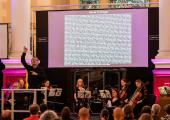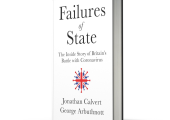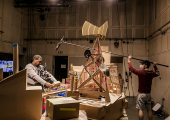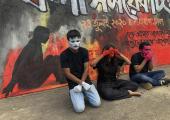Russell Howard, Netflix special review - joyous return to live performance



Sarah Moss’s new novel is a slim snapshot of a moment of fear and danger in the year of Covid. That year when judgement and recrimination ruled, and neighbourly feeling was in short supply. It is almost too close to the bone, but it is a neat examination of humanity in crisis.

Sarah Hall’s Burntcoat is one of those new books with the unsettling quality of describing or approximating a great moment in history and its aftermath, as the reader is still living through it. This could be trite, but Hall manages to make it compelling, tragic, and still sensitive in its handling of a love story during a time of terrible social upheaval.

Following the death last year from COVID-19 of keyboard player Dave Greenfield, it appears the The Stranglers’ five decade journey may finally be drawing to a close. They bucked all odds by maintaining a path after singer Hugh Cornwall left in 1990, and the last two decades, especially, have seen them hold steady, both as a live draw and with critically respected albums.

Harry Grafton (b. 1978) is the preferred title of Henry Fitzroy, 12th Duke of Grafton, custodian of Euston Hall in Suffolk and the man behind the Red Rooster Festival. The latter, during its six pre-COVID years of existence, built a reputation for presenting fresh, fiery and exciting American roots music.

During early lockdown in 2020 Howard Goodall published an article pondering the role of the composer in a pandemic. His answer was that music has throughout history been successful at memorialising people and events, and that it could do so again.

An army on the move must be as disturbing as it is, on occasion, inspiring. In E.L. Doctorow’s startlingly good civil war novel The March, General Sherman’s column proceeds inexorably through the southern United States like a giant organism. It appears as “a great segmented body moving in contractions and dilations at a rate of 12 or 15 miles a day, a creature of 100,000 feet. It is tubular in its being and tentacled to the roads and bridges over which it travels.’'

Almost a year ago, in the midst of the first national lockdown, The Sunday Times broke the news that Boris Johnson had failed to attend five consecutive Cobra meetings in the lead up to the coronavirus crisis. The article went viral, reaching 24 million people in the UK and becoming the most popular online piece in the history of the paper.

“Your task is to imagine the future.” That’s what the citizens of Assembly, a new streamed production performed and devised by the Donmar Warehouse’s Local Company, are told. It can be anything they like, so long as they make it together – which is the catch, of course. Since when did a citizens’ assembly ever agree on anything?

Sustainability and the environment are watchwords for the Prix Pictet, the international photography prize now in its ninth cycle. Since its launch in 2008, it has responded to the state of the world with urgency and compassion, its shortlists all the more intriguing for their oscillations between the universal and the personal, the global and the local.